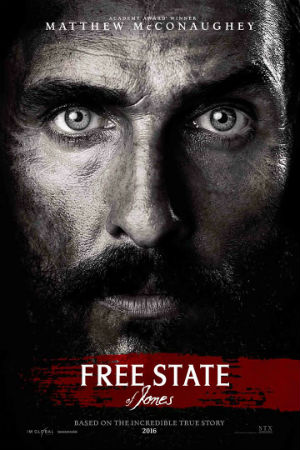Equality, Justice and Governance
Nick Pollard reviews Free State of Jones, the true story of an insurrection within an insurrection
 The powerful and thought-provoking film Free State of Jones is based on the true story of an insurrection within an insurrection. It raises important questions about equality, justice and governance, which are particularly relevant to contemporary political issues.
The powerful and thought-provoking film Free State of Jones is based on the true story of an insurrection within an insurrection. It raises important questions about equality, justice and governance, which are particularly relevant to contemporary political issues.
Matthew McConaughey plays Newton Knight, a poor southern farmer who, at the beginning of the film, is serving the Confederate Army by taking injured soldiers from an American Civil War battlefield to the rudimentary field hospital. (As one would expect from a biopic seeking to be true to the actual events, these opening scenes are graphic and realistic, so sensitive viewers may want to avert their eyes for the first few minutes).
Knight is increasingly disillusioned with the war which he sees as enslaving poor white people to sacrifice their lives and livelihoods protecting a political and economic system built on the slavery of black people. When he is unable to save a young boy (from his home of Jones County) who had been forcibly conscripted as part of the Confederate Army’s requisitioning process, he decides to take the boy’s body back to his family rather than continue as a soldier. He no longer wants to be part of this fight. Knight is not a pacifist, he is quite willing to fight, but only for what he believes to be a just cause.
As he stands up to the powerful people who are oppressing his poor hardworking neighbours, Knight gradually finds himself leading an extraordinary armed rebellion of small farmers and local slaves. When they take control of a local town he declares a ‘Free State of Jones’ with a constitution including declarations that no-one should be kept poor so that another can become rich, and no-one should enslave another.
Knight has no overall strategy or plan; he simply responds to situations as he finds them, fighting for justice and equality for those around him. He is not seeking political power; in fact, when the Union Army defeats the Confederates, Knight and his group are swept aside. The film has been criticised for ‘wallowing in wartime violence and then rushing through the horrors and trauma of Reconstruction.’
But that is to miss the point, as the film has taken time to establish his character and motivation, and does then reveal how he himself falls foul of the segregation laws when he is unable to marry the former slave Rachel (played brilliantly by Gugu Mbatha-Raw) who has stood beside him throughout – an injustice that continues for many generations as illustrated by the flash-forwards showing his mixed-race descendant facing a similar discrimination.
In our contemporary culture, as we consider the motivations and fundamental beliefs of those who seek political power, this film raises important questions about the nature of equality, justice and governance. These concepts have been explored for many years, with different perspectives being proffered.
Free State of Jones presents a thought-provoking counterpoint to the commonly assumed narrative of people from the South willingly sacrificing their lives and homes for the leaders of the Confederate cause. And, as we reflect on what it might have to say to our contemporary politics, it is perhaps helpful to note how this contrast reflects the different foundational political philosophies of Thomas Hobbes (1588-1679) and John Locke (1632-1704).
Hobbes asserted that the life of humanity, in the state of nature, is nasty brutish and short and any rights we may think we possess are only transitory. Therefore, he argued, we should grant power to leaders who are outside the law but impose their authority upon everyone else. Although he spoke in deistic terms he was essentially presenting an atheistic position which does not need objective morality or divine authority for a political system.
In contrast Locke argued that there are basic rules in the state of nature and, because all humans are in some way inherently valuable, we should make a social contract which recognises the rights of all people and places the government under the law rather than above it.
Of course this raises the crucial question of the source of an individual’s value and rights. And it is interesting that in one of the most powerful scenes in the film, Knight invites one of the former slaves to express his objection to slavery: which is that ‘no-one can own a child of God’.
Nick Pollard is is co-founder of the Ethos Community which publishes at EthosMedia.org and EthosEducation.org.
This review was first published on EthosFilmBlog.org and is used with permission

Baptist Times, 18/11/2016